
This is an example of a Regional CS Needs Assessment. The
- Subject:
- Computer Science
- Material Type:
- Assessment
- Author:
- Tina Lemmens
- Date Added:
- 04/23/2024

This is an example of a Regional CS Needs Assessment. The

This is a modified version of the SCRIPT training slides from 2021-22 that is designed for facilitation over three 2-hour virtual sessions.

The "AI 101 Training" workshop, adapted from Code.org's self-paced course into an engaging in-person format, offers educators and administrators a comprehensive introduction to artificial intelligence and its applications in education. This training is designed to empower participants with the knowledge and skills to effectively integrate AI into their classrooms, enhancing both teaching and learning experiences. Throughout the workshop, attendees will explore fundamental AI concepts, learn practical applications for the classroom, and address the ethical considerations of AI usage. By participating, educators will be better equipped to navigate the evolving educational landscape, ensuring that their students are prepared for the future. This workshop is not just an opportunity to learn about AI but a chance to transform teaching practices and stay at the forefront of educational innovation.
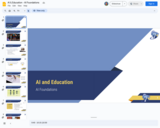
AI & Education - AI Foundations is a slide deck to be used to develop educator capacity around the high level functionality of artificial intelligence, the presence of AI in every day life, as well as connections to the Wisconsin Standards for Computer Science. The resource contains embedded links to videos, instructional resources, and engagement activities.
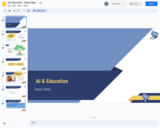
AI & Education - Deep Fakes is a slide deck to be used to build the capacity of educators to teach about Deep Fakes. The resource contains hyperlinks to interactive activities, relevant articles, and instructional resources.

This is a basic presentation called AI for Educators
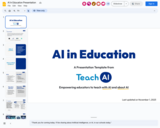
Teach AI resource.

The Games & Gaming Round Table (GameRT) of the American Library Association (ALA) provides a venue for networking and collaboration for library workers interested in the use of games and gaming in libraries.

The Games & Gaming Round Table (GameRT) of the American Library Association (ALA) provides a venue for networking and collaboration for library workers interested in the use of games and gaming in libraries. GameRT was formed in 2011 and with members from all types of libraries, GameRT encompasses a wide variety of viewpoints, situations, and user types.
The mission of the GameRT is to:
- Provide a forum for the exchange of ideas and concerns surrounding games in libraries;
- Share resources to the library community that support building and maintaining library game collections;
- Advocate for initiating and supporting game programming in libraries;
- Create an awareness of, and need for, the support of the value of gaming and play in libraries, schools, and related learning communities;
- Create an awareness of the value of games and gaming in library outreach and community engagement plans.

Using ARIS open-source platform, students create a scavenger hunt/game for district students to explore local community career opportunities. Â

K-5 STEAM Scope and Sequence

In this lesson, students will explore the concept of equity and the varying needs within a community. Using civics and robotics (no previous experience necessary) skills, students will analyze how a robot's trek through a grid represents the endeavor to connect with and assist diverse community members. By reflecting on this symbolic journey, students will deepen their understanding of inclusivity and the importance of addressing individual needs within a community setting.

" This is a graduate course on the design and analysis of algorithms, covering several advanced topics not studied in typical introductory courses on algorithms. It is especially designed for doctoral students interested in theoretical computer science."

Following a brief classroom discussion of relevant principles, each student completes the paper design of several advanced circuits such as multiplexers, sample-and-holds, gain-controlled amplifiers, analog multipliers, digital-to-analog or analog-to-digital converters, and power amplifiers. One of each student's designs is presented to the class, and one may be built and evaluated. Associated laboratory emphasizing the use of modern analog building blocks. Alternate years.

Materials covered include: special relativity, electrodynamics of moving media, waves in dispersive media, microstrip integrated circuits, quantum optics, remote sensing, radiative transfer theory, scattering by rough surfaces, effective permittivities, and random media.
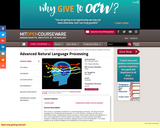
This course is a graduate introduction to natural language processing - the study of human language from a computational perspective. It covers syntactic, semantic and discourse processing models, emphasizing machine learning or corpus-based methods and algorithms. It also covers applications of these methods and models in syntactic parsing, information extraction, statistical machine translation, dialogue systems, and summarization. The subject qualifies as an Artificial Intelligence and Applications concentration subject.

Recent results in cryptography and interactive proofs. Lectures by instructor, invited speakers, and students. Alternate years. The topics covered in this course include interactive proofs, zero-knowledge proofs, zero-knowledge proofs of knowledge, non-interactive zero-knowledge proofs, secure protocols, two-party secure computation, multiparty secure computation, and chosen-ciphertext security.

" This course covers concepts and techniques for the design and implementation of large software systems that can be adapted to uses not anticipated by the designer. Applications include compilers, computer-algebra systems, deductive systems, and some artificial intelligence applications. Topics include combinators, generic operations, pattern matching, pattern-directed invocation, rule systems, backtracking, dependencies, indeterminacy, memoization, constraint propagation, and incremental refinement. Substantial weekly programming Assignments and Labs are an integral part of the subject. There will be extensive programming Assignments and Labs, using MIT/GNU Scheme. Students should have significant programming experience in Scheme, Common Lisp, Haskell, CAML or some other "functional" language."
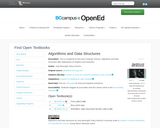
This is a textbook for first year Computer Science. Algorithms and Data Structures With Applications to Graphics and Geometry.

This course is offered to undergraduates and addresses several algorithmic challenges in computational biology. The principles of algorithmic design for biological datasets are studied and existing algorithms analyzed for application to real datasets. Topics covered include: biological sequence analysis, gene identification, regulatory motif discovery, genome assembly, genome duplication and rearrangements, evolutionary theory, clustering algorithms, and scale-free networks.